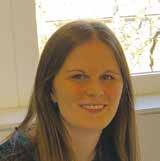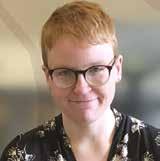Join the National Graduate Development Programme at Kensington and Chelsea
Are you a graduate who is passionate about making a positive contribution to your community while also fast-tracking your career in local government? Join the National Graduate Development Programme at The Royal Borough of Kensington and Chelsea.
The National Graduate Development Programme (NGDP) is a two-year graduate management development programme, run by the Local Government Association (LGA).
Our offer
The NGDP is an excellent opportunity for committed graduates to make a positive impact in supporting Kensington and Chelsea, and provide experience in a dynamic, transforming and socially responsible council.
We are a proud supporter and sponsor of the NGDP, and our departmental placement managers are continuously looking for National Management Trainees (NMT) to join their teams. Successful candidates will be able to pick from a variety of placements so they can begin to shape their careers.
You will be working in key strategic areas with senior managers, directors and councillors across the Council. We highly value the innovation and enthusiasm of our graduates and are proud of our over 10 year involvement with the NGDP from which we have retained 95% of our grads!
All graduates will attend a structured induction programme and have access to extensive ongoing learning and development opportunities
We are committed to ensuring the experience for our graduates is positive, challenging and unique. We provide each graduate with a placement support mentor and an alumni graduate buddy. Plus, you’ll have plenty of opportunities to meet peers through our Young Officers Network, join cross-cutting council initiatives such as becoming a Diversity Champion or Tech Agent, or volunteer through our Employee Volunteering Scheme!
Your placement
Our programme aims to partner the interests of our graduates with the Council’s strategic needs to deliver the greatest value to the local community while enhancing the management capacity of the trainee. Placements are available across the entire council, including with the Chief Executive and Leadership Team and shared service with Westminster City Council
You will gain a postgraduate ILM (Diploma in Leadership and Management) qualification Level 7.
Graduates are employed on a 36-hour week, two-year, fixed-term contract and complete four placements over the two years. The salary of each graduate starts at £29,271 increasing to £31,434 [PFCR1] in the second year on the scheme.
Our Graduates experience
- Isabella, Cohort 17

Isabella’s first placement was as a Community Engagement Project Officer. Her work varied from assessing council readiness to accommodate Syrian refugees, to organising events for residents to meet and quiz the Leader of the council.
Her second placement was as a Housing Officer and provided invaluable frontline experience, working directly with the boroughs’ diverse population and other services.
Her third placement was in the Innovation and Change Management Team and provided contrasting opportunities to previous placements, namely; project management, fostering innovation and the change cycle.
Her final placement was in Children’s Services Commissioning and spanned three boroughs.
"I hope my experience demonstrates the value of and the sheer variety of placements on offer!'
Isabella now works as a Programme Manager in the Lancaster West Neighbourhood Team, running estate improvement initiatives in a unique and challenging context.
- Victoria, Cohort 18

Victoria’s first placement was with the Kensington and Chelsea Digital Programme - a council-wide programme aimed at changing the way we interact with residents, visitors, and businesses, using technology in the most effective way. By moving both front and back office services online the council can achieve one of its most important goals- improving customer satisfaction and ease of use while providing value for money.
She was a lead project manager overseeing the work of five workstreams. As part of her role, she helped coordinate the workstream leads to ensure delivery of the project. She was responsible for a workstream to improve email feedback received by the environmental health team and another which created a webpage for new residents.
"My largest piece of work focused on moving the housing benefits forms online. This required detailed analysis of the current process as well as working with the service to come up with potential business savings and a new to-be process."
Victoria then joined the Housing department inthe Transformation team. Looking at the strategic side of service delivery, she worked with Housing Officers across the borough to understand their current processes and updating the policies and procedures to reflect and improve them. Whilst doing this, Victoria developed a proposal for collecting and incorporating resident insight to shape service development and focus changes on what residents really want to see. Instead of taking an ad hoc approach, we would be able to tailor our strategic changes to meet genuine service demand.This proposal, which covered the entire Housing department, was adopted and Victoria was able to work with senior managers to get the project off the ground.
In her third placement, Victoria became the project manager for the implementation of the Homelessness Reduction Act within Housing Solutions. A new piece of legislation, the HR Act required a new approach to homelessness to be taken: prevention of over processing. Victoria worked with senior managers to bring in a new interim structure, procured an IT system and redesigned the service to meet increased (37%) demand and requirements under the Act.
- Isobel, Cohort 19

Isobel’s first placement was in the Economic Development Team. This role offered her exposure to a wide variety of tasks, including working on affordable workspace. She was also responsible for a project that focused on providing a refresh of Section 106 Codes on Employment and Skills and Business Investment. This required her to collaborate with various teams across the Council, and enabled her to influence and deliver a key piece of work while putting her understanding oflocal democracy into context.
For her second placement Isobel worked in bi-borough Public Health based at Westminster City Council. The role involved project and programme management, ensuring best practice including planning, risk management and documentation; contributing to the Intelligence Team evidence base to inform Public Health priorities and programmes; and supporting the implementation of the Public Health business partner model. A key aspect of this role involved project managing the Bi-borough Annual Public Health Report 2017/18. As the focus of this report was on the lived experience of young people across the bi-borough, Isobel engaged witha variety of young people and stakeholders who were able to discuss with her their experiences of living in the boroughs. Isobel also supported the Public Health commissioning team in this placement, including meeting with residents and services in consultation.
Isobel spent her third placement on secondment to the civil service. This role involved project management, planning and policy development across the International Climate and Energy Directorate in the Department for Business Energy and Industrial Strategy to prepare for the outcome of EU exit negotiations on climate change. As a policy advisor her role involved coordinating parliamentary engagement and external communications on EU exit and climate change, as well as feeding in to advice for ministers and the resulting outputs. The role provided support preparing for the transition to new types of climate change cooperation both with the EU and internationally, embracing international agreementson climate change, as well as EU legislation.
Initially her role also focussed on the events programme and delivery of the UK Pavilion at the United Nations Climate Change Conference:COP24. This involved working across the directorate and liaising with external stakeholders to develop its strategy and putting together its programme of 55 events. Isobel was the focal point for delivering the pavilion programme during the first week of the conference.
Isobel will be spending her final placement in Community Safety.
Isobel says, "Being on the NGDP at RBKC is a unique experience. Whilst on the NGDP I have worked with residents, businesses and a variety of teams, giving me the chance to gain an appreciation of how to work with residents to make their borough the best for them. This has also improved my understanding of the importance of maintaining a level of accountability to my work and has enabled me to see the impact of the work I am doing."
- Jacob, Cohort 19

Jacob’s first placement has been as a Project Manager within the Digital Programme at RBKC. In this role he had the opportunity to lead a project changing the way in which the Council communicates with residents via its website.
In order to do this he worked with a range of departments, to better understand their processes and needs, and align these with the needs of customers. He also had the opportunity to support other project managers on the Digital Programme, and undertook a wide range of activities, from helping reform departmental communications, to undertaking essential research, and consulting customers on new ways of interacting with them.
He says, "I have found that working as a Project Manager, I really have had to engage a wide range of skills; this job is not just about being organised and performing detailed and careful analysis, but about building relationships and persuading people to put their trust in you. I have really enjoyed being part of a team that is pulling together to deliver a real programme of change."
"In my second placement I worked in the Integrated Commissioning team as a Service Development Officer. I worked with colleagues from the NHS to design joined-up mental health services for children and young people, and worked on overhauling the way we deliver youth services for vulnerable teenagers in RBKC. In this role I developed a wide variety of skills including community engagement, research and report writing, financial modelling and partnership working."
"I am currently working as a Service Improvement Officer in the Housing department. I’ve had the opportunity to lead projects changing the way we deliver our homelessness services, and I am currently working on designing the operation of a new repairs service for over 12,500 homes. I’ve been able to apply the learning from my previous placements and am delving into the intricacies of designing services and implementing real change."
"At RBKC I have been able to steer my development, choosing and designing placements around work that interests me and helps me build the skills I need for my future career."
- Laura, Cohort 19

Laura’s first placement has been as a front-line Housing Officer, working with Council tenants and leaseholders to get the best outcome for residents in the borough. This placement enabled her to work with many different Council departments. The role required lots of resident engagement, whether by visit or on the phone, which gave her a great insight into the varied nature of tenancy management, and how services link up within the Council to support tenants. This gave her the opportunity to get to know the residents of the borough and the issues that are affecting them. This placement has been extremely varied, with her responsibilities covering everything from anti-social behaviour complaints to estate inspections. No two days have been the same!
Laura says, "This placement has helped me develop a resilient attitude and enhance my communication skills. I have especially enjoyed the high level of resident engagement and think this will be highly beneficial for future placements."
"RBKC was my first choice. You have the flexibility to choose your own placements in areas that really interest you."
For her second placement, Laura chose something to contrast with the previous placement. She is enjoying the variety and diversity of placements RBKC has to offer and has just started her second placement in a strategic and operational role.
"The three placements that I have done have been so varied and I have learnt something different from all of them."
At the end of her third placement, Laura got a permanent job in the Community Safety team.
- Naomi, Cohort 18

Naomi’s first placement was within the Public Health Intelligence team, where she carried out research and analysis to help inform the Joint Strategic Needs Assessments – work that informs Public Health activity across the borough. During this placement she applied for a weekend role as a sessional registrar, and continues to do so at weekends.
In her second placement she acted as a frontline housing officer. This was a challenging and varied role, involving a great deal of resident engagement and interaction with other departments. During her time there, she was involved in establishing a new Tenants and Residents Association for the Riverside Gardens estate, helping residents there to better represent themselves in planning matters and improving their area.
Naomi’s third placement was in the Communities and People team, set up in response to the Grenfell Tower tragedy in June 2017. Within the Health and Wellbeing team, Naomi works with other departments and community groups to improve the delivery of services in North Kensington and improve outcomes for residents.
- Phoebe, Cohort 19

Phoebe’s first placement was in community safety and emergency planning. The Community Safety Team lead on a variety of strategic and support initiatives. During her placement she worked with colleagues in other departments, third-sector organisations and the local police teams. She wasinvolved in developing a service to support victims of hate crime in the borough, creating a knife crime action plan documenting the work the Council does to reduce knife crime, assisting the police with bike marking events and contract managing providers.
She says, “Within the emergency planning team I have gained a better understanding of the Council’s governance and procurement processes. Working with colleagues in the air quality team to develop a strategy to reduce the Council’s fleet emissions and drafting service specifications and contracts for upcoming procurement exercises.”
Phoebe adds. “For a first placement, the variety of work across the two teams has been great. My team have been really supportive and I’ve really enjoyed working with different stakeholders like the local police teams.”
"My second placement was housing, working on projects within the housing management division (working to support staff in their transition from the TMO to the Council housing services and helping to prepare the service for the implementation of GDPR) and housing commissioning teams (undertaking activities to review supported housing services; such as carrying out visits and interviewing staff and service users)."
"I was also involved in a procurement exercise to find an organisation to run a set of engagement activities (including an satisfaction survey) for tenants and residents within the borough; working with a group of residents/tenants to assess potential providers. It was exciting to be a part of a procurement exercise where residents/tenants were part of the assessment panel and were engaged and involved in the process."
My third placement was on secondment at the Civil Service in the Department of Education in the Institute of Technologies Team within the Higher and Further Education Directorate. The IoT team is a delivery team set up in response to the Ministerial commitment to establish new institutes of Technology which will deliver high level technical skills, particularly STEM. As a delivery and implementation lead, I was involved in the monitoring and delivery aspects of the programme, such as preparing monitoring documents, using Agile methodologies to track progress at team meetings and undertaking research to support policy briefings. I feel really lucky to have had the opportunity to undertake this unique placement.
- Caroline, Cohort 17

Caroline’s first and second placements were with the Economic Development team, focusing on both business initiatives and external funding.
Caroline says, "One of the highlights was co-leading on ‘Passport to Knowledge and Creativity’, an initiative connecting small creative businesses with the world class creative institutions in the borough, working with business contacts in the Victoria and Albert Museum, Design Museum and Kensington Palace. ”She enjoyed the engagement work with local external partners to ensure their involvement in economic development priorities including the Royal Borough of Kensington and Chelsea Chamber of Commerce; Leighton House Museum for the ‘Art on Loan’ programme, and Earls Court development, one of the largest regeneration projects in central London.
Her placement also had a large international element and involved working with colleagues from institutions across Europe. As lead partner on an ‘EU Erasmus’ bid - with the community safety VAWG team, plus Greece, Spain, and Romania -she had workshops with the consultancy Access Europe, sat on the partner selection panel and wrote sections of the bid to secure £270,000. She also wrote the key decision report to successfully gain cabinet member approval for an ‘EU Horizon’ grant to deliver ‘Smarticipate’.
Her third placement was in the Innovation and change management team where she project managed and worked with departments on measuring satisfaction, part of the ‘Resident, Business and Visitor Satisfaction’ corporate programme. Working as a consultant for the housing department, she explored options for older people’s housing.
She has just started her final placement in Children’s commissioning and one of her main projects will be working on developing a new integrated family support service, which will transform the delivery of Family and Children’s Services.
Caroline then secured herself a permanent job in the newly created Bi-Borough Integrated Commissioning Directorate, working in Adult’s Commissioning.
“The role is really interesting, with lots of challenging pieces of work to further strengthen my skills and experience. This includes a main focus of my work being on homecare, a high-profile area of the Council. I particularly enjoy the variety, working with a wide variety of stakeholders.’’
- William, Cohort 20

William says: “I applied to Kensington and Chelsea because, after the Grenfell tragedy, it was a local authority in transition. I wanted to be a part of how local government changes in the wake of this national tragedy and of the ongoing process of trying to provide more accountable, representativeand compassionate public services.”
As a result, William sought out his current placement as part of the Lancaster West Neighbourhood Team. The Lancaster West estate is home to Grenfell Tower as well as over 800 properties.
“I’m a community development and communications officer. What that means in practice is working one-to-one with residents of the estate, supporting them with everything from confidence to employment, working with the residents association, leading the team’s communications and a number of other projects. I’m staying in my current placement because I feel like there’s so much more work to do and I have loved getting to know residents and my team members.”
Why join the NGDP at RBKC?
- Choose you own placements in the areas that most interest you
- Fast track your professional development.
- Earn at least £29,271 a year, employed on a two-year, fixed-term contract.
- Work for Kensington and Chelsea, one of the most vibrant, diverse and changing areas in London.
- Enjoy placements in key strategic areas across the council, such as policy, social care, transformation or economic development
- Structured induction program, along with extensive ongoing learning and development opportunities, tailored mentoring and career development programme
- Access to professional networks such as our Young Officers’ Network
- Dedicated Employee Volunteering Scheme
- Upon completion of the NGDP, graduate trainees receive an ILM Level 7 Certificate in Leadership and Management, equivalent to 20 credits at postgraduate level.
Ready to apply
Visit the Local Government Association’s National Graduate Development Page
Last updated: 28 June 2021
